#I’m a proletariat
Explore tagged Tumblr posts
Text

am I going insane. we understand that there are service jobs that aren’t food service right
30 notes
·
View notes
Text
We should make a political party that has a secret agenda only the in people know but their outwards agenda is like, free champagne for everyone and so ✋🏼🧚🏼 skedaddles out of here but like all the commies stay and we hang out with them in a country that’s free of ✋🏼🧚🏼’s nefarious bourgeoisieness. Also we should elect this party in every country except like, an empty wasteland in the desert. So ✋🏼🧚🏼 skedaddles off into the desert and there’s a high density of ✋🏼🧚🏼s in the desert and then we should nuke the desert and be rid of ✋🏼🧚🏼 once and for all that bourgeoisie bitch I hope she dies I would do anything and everything if it meant she died I would do anything at all I don’t care what the consequences would be she needs to die at any cost.
#Do I see myself in her?#Basically#I’m famous on Reddit#They don’t know about my sins over there#I mean y’all don’t know my sins either#Last time I tried to confess I got called a liar and an attention seeker#the literal nurse I talked to in the hospital the first time I tried to kms didn’t care#I submerge myself in writing because in stories I can make the proletariat win#I was stupid back then#nobody cares#Y’all motherfuckers voted for Trump I don’t expect you to care#I hope the 🐌 guys succeed at ethnically cleansing the 🐌 the other ethnicities deserve so much better than this stupid fucking 🐌 I hate 🐌#my neighbour is literally 5 and he’s suicidal#I am constantly going against the norms of society#It’s like I’m an alien#original post
2 notes
·
View notes
Text
i lost all respect for zinchenko when he said all russians should be expelled from football in an interview with piers morgan so his pro israel shit doesn’t surprise me. fuck him fr
#mytxt#arsenal#and before y’all get shit twisted and think i’m supportive of putin no i’m not but the ukraine govt and army isn’t innocent#i am for the proletariat of both russia and ukraine
2 notes
·
View notes
Note
is there any room for shein in leftism at all? like what if you’re poor and fat and that’s the only place that sells clothes that are cheap enough to fit a larger body? i saw someone staunchly defending this position online. is there something i’m missing? i thought shein’s existence was completely antithetical to leftist ideology???
The question doesn't make sense - if by 'leftism' you mean communism, then communism isn't based on individual shopping habits. A socialist state is brought about by a proletarian vanguard party waging revolutionary war, not by buying from 'ethical' brands (which don't exist, all businesses under capitalism subsist off the exploitation of the proletariat; and all interactions under capitalism have within them the kernel of all contradictions within capitalism).
Should you buy from Shein, or whatever other company? Who cares? Excepting an organised boycott by said proletarian vanguard party, nothing you as an individual do will have any influence on society at large, it is random noise which will be cancelled out by some other random individual action of the opposite sort.
Under socialism, will Amazon continue to exist? Will it be reorganised? Will H&M and The Gap be made to operate more sustainably? These are questions entirely separate from 'which capitalist should I personally buy my shirt from?'
Lifestyle-ism is not revolution.
153 notes
·
View notes
Note
as an ml, do you believe acab and why? honest question, just seeking to understand, I’m aware of messed up things cops have done but idk if I can accept that every cop is inherently morally compromised or that policing is inherently evil
acab is not about every single cop being individually or interpersonally 'evil'. it is about the role of police in society and the role of police as an institution. the police in a bourgeoisie state exist to enforce the power of the bourgeoisie against the proletariat--this means, first and foremost, protecting private property rights and suppressing resistance to the bourgeoisie state.
however, to be clear, almost all cops are corrupt violent racist pieces of shit. this is not because of some magic Cop Curse that turns them evil, but because the institutions of policing are designed to filter out anyone who has any genuinely good intentions. ''good cops'' flunk out of police training, quit, or get killed by the rest of them. cops are taught to be violent, racist, and escalatory and are rewarded professionally for doing so and bullied and driven out of the force if they refuse to be.
under a socialist state, the role of the police is no longer to protect the interests of a bourgeoisie class. however, there still exists a very real danger of them still becoming an oppressive force in their role as 'special bodies of armed men' as lenin puts it, existing in a role in society that inherently separates them from the rest of the proletarian class rather than allowing them to exist within it as 'self-arming autonomous organizations' (lenin goes over this distintction in the first part of state & revolution)
tldr: all cops are bastards
984 notes
·
View notes
Text
Do people who work full time still have emotions, feelings, fun, etc? I know I don’t. I don’t have time for passion. Working keeps me so tired I’m lobotomized and no longer a threat to authority. I’m too exhausted to get angry. BRB I have to wake up at 6 am once again to help boomers use Microsoft word without having a mental breakdown. This is just an adult daycare to keep the proletariat busy while the Rothschild family drinks adrenochrome lol!
177 notes
·
View notes
Text
So imagine you’re at a dinner party. Nice enough person comes up to you, starts talking to you. Let’s say the conversation starts to go in the direction of politics. You talk for a while. At some point in the conversation you decide to ask this person, “So what are your particular feelings about politics? I mean, where do you land on the whole political spectrum?” Imagine the person replies with, “Well, actually, I’m a communist. Communism is the solution to all of our political problems.” Now, to us, being people living in the 21st century that have seen history play out the way that it has, no matter what you think about communism, we would instantly have a lot of thoughts about this person and probably a few questions we wanted to ask them. See, because the word “communism” carries with it an enormous amount of baggage to us in the 21st century, baggage, it’s important to note, that just didn’t exist when people were having political discussions at the beginning of the 20th century.
That’s what I want us to consider here at the beginning of this episode, just how much has changed, just how much has transpired since philosophers were having these political discussions at the beginning of the 20th century. What I want to do is try to take a step outside of our 21st-century biases and try to do our best to put ourselves in the shoes of someone viewing the political landscape back when communism was first being proposed as a potential solution. See, because when you do that, you can start to see the political philosophy of the time within its proper context. You can start to see how, in many ways, the goals of the reformed democracy that we talked about last time and the goals of the communism that was being proposed back then were actually incredibly similar.
Remember, at this point in the timeline of discussion about political philosophy there were three major conversations that were going on that were all trying to solve the same general problems that existed in political philosophy of the time. One was democracy; one was communism. And the general problem they were both trying to solve was “How do we ensure that in the future society doesn’t evolve into a situation where a relative handful of people have an inordinate amount of control over the lives of the majority of the population?” This had been a serious problem in the past. Democracies of the past had produced this situation time and time again, which was why there was such a serious discussion about a reformation of democracy that would preserve the true essence of a democracy, which was a government by the many, not a handful of people.
Well, communism was very similar in terms of what it was aiming to do at the time. Like we talked about when we did the series on the Frankfurt School, for neo-Marxist thinkers at the beginning of the 20th century, there was a short period of confusion when it came to what exactly was going on in the world. See, Marx prophesies that very soon the proletariat would realize that all they had to lose were their chains, and that, inevitably, they would rise up; they would overthrow the bourgeoisie, and they would implement a new system of economic order. Let anyone who agrees with Marx at the time cross their fingers and hope that it ends up being communism. But this communist revolution just wasn’t happening in the West in almost every case. So what exactly was going on?
Neo-Marxist thinkers went back to the drawing board. Why does it make any sense at all that people living in these abject conditions, working jobs that were in many cases completely brutal, why would those people stand for it? Why didn’t Marx’s prophecy come true? Well, very quickly the trend that emerged in neo-Marxist thought at the time was that control over a population of people extends far beyond the halls of Congress or the ballot box. Political control is almost always dictated by cultural control.
This is why the Italian philosopher Antonio Gramsci spends a considerable amount of his work exploring the concept of political control and, more specifically, the very important question of “When there is a dominant social group, or a dominant class within a society, how exactly does that group ascend to power, and then beyond that, how do they maintain that power once they’ve gotten it, especially when the social order that they promote with that position of power is oftentimes completely at odds with the well-being of the average person?” The fact is that sometimes when a leader is elected, they don’t pass policy that’s necessarily good for the majority of the population. Sometimes they support policy that really only benefits them or friends of theirs that are fellow members of a dominant social class. Gramsci wants to find out, why is it that these leaders are sometimes capable of getting massive support from the people for policies that are actually hurting the average citizen more than helping them? How is it possible that the proletariat can feel so comfortable participating in a system that keeps them in chains, in the eyes of a neo-Marxist thinker?
Gramsci begins his explanation by evoking and repurposing a word that had been thrown around all throughout human history, but it was a word that he thought in recent years was starting to take on an entirely new meaning. The thing that was responsible for allowing a particular social class to ascend to power and then maintain that privileged status was what he called “cultural hegemony.” Now, this concept of hegemony is going to end up being massively important to the political conversation of the 20th and 21st centuries overall. And by the end of this arc on the show, we’re going to have looked at it from a lot of different perspectives.
But maybe the best place to start is to talk about the origins of the word. The word “hegemony” originates in ancient Greece. The root of the word comes from the Greek word meaning “to lead.” Some translators think it’s closer to the Greek work for “to rule over.” But, either way, during antiquity there were things called hegemons. Now, in the context of ancient Greece, a hegemon was typically a state that had a significant military advantage over another state, the arrangement being that if the weaker state didn’t comply with certain demands from the hegemon, they would be annexed or dominated militarily or burned to the ground. Take your pick, I guess. In other words, the term “hegemony” implied the threat of physical dominance over a population of people. And this was the case all throughout human history.
But Gramsci’s going to say that in our modern world the definition of the word hegemony needs to evolve with the political reality we are living in. We are no longer living in a world where most political control is exercised by military dominance over a population of people. Since the advent of mass media, people in positions of power have realized that a much more effective way of controlling populations is by manipulating the cultural parameters that citizens have to navigate. The general idea is this: to be a human being, living a life in our modern world at all, you always have to be living that life immersed within a particular culture. But what is a culture other than an elaborate collection of norms, rules, structures, mores, taboos, rituals, values? These things are not exactly abstract concepts. They are acute. They are visible. This is the cultural custom of a handshake, to pay deference to somebody else. This is not talking with your mouth full. This is the sum total of every ritual we engage in on a daily basis that all come together to create a cohesive society.
But what Gramsci’s going to ask is, who exactly created all of these norms and taboos that we abide by? We can easily look to different cultures around the world presently and all throughout human history, for that matter, to see that a culture can function and flourish when things are completely different. The norms and taboos of a culture can be completely alien from the modern world that we’re living in and, yet, things still somehow manage to stay held together. So it makes Gramsci wonder, to what extent is the current set of norms and taboos serving to reinforce itself? To what extent are the citizens seeing the current set of norms and taboos not as a temporary instantiation of culture, but as just the way the world is. Once again, this is another example of this classic debate we talked about last time that’s going to become increasingly relevant. How much of the reality of the world can be explained by nature, and how much of the world can be explained by culture?
This is extremely important because, to Gramsci, if you can control the narrative and you can convince the average citizen that the current set of cultural norms is just the way the world is, then there’s not going to be much complaining. There’s not going to be much in the way of seeking justice and trying to change things. This is similar to a point we discussed from Simone de Beauvoir and The Ethics of Ambiguity. We don’t get mad at hurricanes. When a hurricane comes along and devastates multiple cities, people die; homes are destroyed, billions of dollars in damages, thousands of families displaced. And every one of those cases is a tragedy in its own right. But, as human beings, what do we do? We accept it. Why? Because there’s no sense in getting mad at a hurricane. There’s no human intent or will behind a giant storm. Nobody can be held morally culpable, so we chalk it up as an unfortunate series of events. Hurricanes are a part of nature. There’s nothing we could really do to stop it. Sometimes the world is going to be at large, and I just got to deal with that the best way I can and try to accept it.
To Gramsci, this is the old switcheroo that’s going on with cultural hegemony. Dominant social classes have the ability to dictate cultural norms. These cultural norms oftentimes serve to reinforce themselves, and people born into these cultures oftentimes view the normalized state of the world around them as nature rather than culture. Gramsci thinks this is a cultural story that’s being told. So often, citizens see it as just the way the world is and something they need to learn to accept. To Gramsci, this is why Marx’s prophecy hasn’t come true. This is why the proletariat continues to live in chains, because they’ve come to accept those chains as the natural state of the world that they need to come to terms with.
Cultural norms become to the average person what Gramsci calls the “common sense that they use to make sense of their place in the world.” When the common sense of your world serves to legitimize the dominance of a particular class of people and tells you that anything you don’t like about your socioeconomic situation, well, that’s just the natural order of things, then your very existence becomes reinforcing of cultural hegemony. You are reinforcing the political status quo simply by participating in the culture that you happen to be born into. This is why people that would otherwise never stand for being pushed around can find themselves getting worked into the ground in a factory, during the time of Gramsci, only to accept their place in the world as a necessary part of how the world works. “Parts of my life may be hard, yes. But you know what? That’s life. Life is hard sometimes.” That’s the sort of dialogue that goes on in the working class.
But, look, it’s not like -- okay, it’s not like Gramsci’s saying that life should never be hard here. The more accurate question would probably be, how hard does life need to be for a person? And how many hard aspects of life have been made into a normalized part of our modern world that we just accept, that disproportionately serve to benefit a dominant group within society? Being a neo-Marxist, you can no doubt guess what his first and most commonly used target is throughout his work, capitalism. So, to Gramsci, even people that are struggling within a capitalist system have, oftentimes, lived their entire lives immersed in a culture that promotes the merits of capitalism. This, in turn, creates a sort of economic Stockholm syndrome where, despite the fact they’re struggling, the citizens identify themselves and their place in the world in relation to capitalist ideology. When the entire way that you view the world has been given to you by a culture that benefits from maintaining capitalism, Gramsci would say, don’t be surprised if that education produces a few blind spots.
These blind spots are the point, okay? Cultural hegemony in many ways is accomplished by getting consent from the population to keep things the way that they are by making sure people are blind to other options at their disposal. Keep in mind, as we continue talking about cultural hegemony, that this isn’t always accomplished by an organized group of people that are actively trying to control things. Cultural hegemony can exist, and people can be a part of perpetuating that status quo just simply by acting out of their own self-interest. See, because their self-interest is always considered in relation to how the current system can help them, they unintentionally end up supporting things staying the same.
What Gramsci’s getting at is that for any single person or any social institution to appeal to groups that are in positions of power for the sake of your own self-interest, you must in some capacity there go along with the way that things are currently structured. So, for example, if you’re a politician or a social commentator that wants to make the world a better place, the only way you are ever going to be able to get your message across is by participating in the existing culture and using the tools at your disposal. This is an ideal situation for cultural hegemony and one of the goals of its final stages to Gramsci, to make the values of a particular culture seem so a part of nature and so in line with “common sense” that the members of that culture don’t even question them anymore; to get people completely entrenched in this world where they mistake the reality of their culture for the reality of the universe; to think the reason things are staying the way that they are is because people are weighing all their options, they’re thinking about it for a while, and then they’re making the best choice, not merely complying with the demands of a cultural hegemon that has control over them.
That said, just like the militaristic hegemon of ancient Greece, the goal of cultural hegemony is to stay in power. Now, over time, dominant social groups have realized that the most efficient way of doing this is by controlling people’s systems of values. Gramsci thinks by and large people acquire their systems of values by listening to and studying voices within a culture that he thinks are massively important, public intellectuals. Gramsci makes an important distinction here between two very different types of public intellectuals. There are “ruling intellectuals” and “organic intellectuals.”
Now, the “ruling intellectuals” are going to be the sort of foot soldiers for the dominant set of cultural norms that are currently in place. These are the people whose commentary on the world is going to reinforce the status quo. Keep in mind, again, this is in no way saying that these are bad people, necessarily. Most of them may not even realize what they’re doing. But Gramsci, nonetheless, wants to shine a light on the insular and, oftentimes, self-reinforcing world that many of these intellectuals come from. So often, it’s from academia. So often, these people are completely out of touch when it comes to what life is even like for most people in a culture.
Think about the common archetype of a philosopher throughout history. Philosopher decides they’re going to resign themselves from public life, lock themselves away in a tower, and just think about stuff really, really hard. That’s the path for creating better philosophy. You know, the last thing you’d ever want to do as a philosopher is have the basic thoughts of a normal, everyday person corrupting your unparalleled genius, right? Gramsci thinks this is completely ridiculous. Not only is this elitist and making tons of value judgements about how certain human experiences of the world are inherently better and can even be corrupted by other people’s experiences of the world, but aside from all that, Gramsci thinks this approach actually prevents you from ever being able to participate in discussions about politics at all, because political discussions always begin from the starting point of self-awareness and self-reflection, while considering how that self relates to all the other people around you. And how could anybody locking themselves away in a closet, thinking about stuff, ever hope to contribute to that conversation?
But, nonetheless, these ruling intellectuals oftentimes dominate the ideas that are available to citizens of a society. I mean, so often these intellectuals are the ones that write the articles. They’re the ones published in journals. They conduct the studies. They write the textbooks. So often these intellectuals control the education of the next generation of citizens, when so much of their prominence as an intellectual was only given to them simply because their ideas corresponded with the existing social order.
Here’s what Gramsci’s saying. Cultural hegemony is established by taking control of three things: the intellectuals of a society, the education within a society, and the philosophy that drives people to political action. So, in other words, if you’re someone that came up through the education system of an advanced capitalist society, Gramsci would say, don’t be surprised if there are some pretty glaring holes in your understanding of capitalism because, just statistically, most pieces of information you’ve ever had access to have been written by people that reached that level of social influence by participating in a capitalist system that benefits them. Your high school or university wasn’t taught by unbiased monks on the top of a mountain. That most likely, once again just statistically, you have come up in a world where you are far more likely to hear about the merits of capitalism and all the good that it’s doing for people in the world.
When conversations about the downsides of capitalism come up, you’re far more likely to hear them glossed over by other people. You’re less likely to have someone call you out for glossing over them. And the conversation’s likely to go in the direction of how the good of capitalism drastically outweighs the bad. When you hear people talking about socialism, when coming up in an advanced capitalist culture, you’re far more likely to run into conversations about the horrors of socialism, how it’s failed everywhere it’s been tried. And, if anyone brings up something good that socialism seems to have produced, it’s written off as a “broken clock’s right twice a day” sort of thing.
Now, here’s the really interesting part. This view of economics and how it plays out in the world may be absolutely true. Capitalism could just be a better economic system than socialism. But how would you ever know for sure? Because if you’re an intellectually honest person, you’d at least for a second have to consider that maybe your entire understanding of capitalism and socialism has been given to you by a handful of intellectuals you’ve entrusted your worldview to, that are intellectuals and gain their credibility simply because their view of the way the world is corresponds with the dominant cultural narrative that keeps the status quo going. Whether maintaining that status quo is good for a particular social group that’s pulling the puppet strings or whether it’s good for just keeping society stable, what if you’ve lived your entire life learning from a lot of really smart people that are all just telling the same side of the story?
Now, Gramsci would say that this is not just limited to capitalist societies, that it’s entirely possible to come up in a society that unfairly promotes the merits of socialism and creates the same sort of echo chamber of ideas. Gramsci’s goal was not to replace a Western world dominated by capitalist ideology with one dominated by Marxist ideology. His goal was to replace both of these narrow approaches with an ideology where the public has a general and intense level of skepticism about the status quo, no matter what the status quo looks like. The biggest mistake we can make, to Gramsci, is to see these ideologies as nature, or the way that things are. We should always be critical of the status quo. And the fact he’s so critical of capitalism is just him following his own advice about the status quo of the world he happened to live in.
To make a long story short, Gramsci thought that Marx and so many other Marxist thinkers that came after him were putting the cart before the horse, in a way. They were all so wrapped up in the possibility -- the inevitability of a communist revolution in the West. They were so wrapped up in waiting to see capitalism destroy itself that they completely missed the fact that different methods of cultural control could fragment a population to the point that a revolution could never take place.
Gramsci makes another important distinction in his work directly to these people that were calling for revolution, that for any meaningful social change to ever take place, regardless of what it is, there needs to be two wars that are fought and won: first, a war of position, then a war of maneuver. These orthodox Marxists of his time were far too focused on the war of maneuver, which was the actual communist revolution that they wanted to bring about. But Gramsci says, before that can ever happen, you need to defeat the cultural hegemon in a war of position.
Remember, a cultural hegemon will have control over three things: the intellectuals, the education, and the philosophy of a society. The goal of anyone trying to bring about any kind of social change, to Gramsci, should be to provide alternatives in all three of these areas. They should create a counter-culture, an alternative set of cultural norms and taboos, reinforced by the intellectuals whose job it is to actively challenge the status quo. He called this other type of intellectuals “organic intellectuals,” and it was their job to be skeptical of the existing order of things, to provide an alternative means of education that took cues from the counter-culture that was created, and to embolden the average citizen to take political action by giving them a philosophical outlook that changes the way they see themselves and how they fit into the world.
This is why so many attempts at revolution have failed in the past, to Gramsci. The orthodox Marxists that tried to organize it didn’t understand the “common sense” of the workers that needed to carry out the revolution. These workers saw themselves and their place in the world solely in terms of how they relate to capitalist ideology. The only way to shift their perspective enough to see the other side would be to fundamentally change the way they look at the world philosophically. See, an extremely important term in the work of Karl Marx that was used to describe the way he saw things was “historical materialism.” Gramsci was a neo-Marxist. When it came to these orthodox Marxists that we’re talking about, he distanced himself considerably from them. And a big reason why was because he thought they were paying way too much attention to the materialism part of historical materialism and not nearly enough attention to the historical part of it.
Gramsci may have supported communism, and communism may have played out in a particular way all throughout the 20th century. But Gramsci hated Stalin. He would have hated Mao. He would have hated Pol Pot. He saw people like these as opportunistic dictators, that took what could otherwise have been a revolutionary political philosophy, and they used it to create dictatorships where the population was forced to deify and worship the state. When, to Gramsci, a much more accurate reading of the work of Marx would have produced the true essence of his work, the spirit of revolution among people, the spirit of revolution among common people united under the desire to never again allow a handful of people to dominate and control the population. To those living at the time of Gramsci, communism and democracy seemed to be two extremely difference approaches to trying to solve the same general problem.
See, as we already know from earlier episodes, the feeling around this time in the world of philosophy is an intense skepticism towards reason. The Enlightenment gave us the hope that science was the answer. Science, when given enough time to develop, was capable of giving us answers to problems that throughout history have seemed completely unsolvable. When applied to the realm of political philosophy, for over a hundred years it seemed totally plausible that something like science, something as unbiased and without an agenda as science, could eventually study the way that people are, study their brains, study the way people work together within a society, and it didn’t seem crazy to think that science could eventually give us answers to some of these questions in political philosophy that seemed so difficult to answer.
But along came Friedrich Nietzsche, philosophizing with a hammer. Because at the end of the 19th century he asked the question, “What if the very act of conducting science at all carries with it cultural values that narrow and distort its findings?” We know there are many different ways of conducting science, depending on the specific field you’re in. We know that scientific revolutions have occurred where there have been wholesale transformations of the methods and assumptions that science is conducted through. What if these limitations and the unavoidable narrow scope that categorizing the universe must be viewed through is missing out on something crucial about what it is to be a human being? What if science, useful as it is, was never the savior that everyone thought it was? More on that next episode.
Episode #131 - Transcript - Gramsci, Cultural Hegemony - Philosophize This! - Stephen West
36 notes
·
View notes
Text
Stop Trying To Defeat Racism With Logic
There's a black samurai in the new Assassin's Creed game, and it has made some people mad. You simply don't have to argue about it.
The new Assassin’s Creed game is set in feudal Japan, which is cool. It stars what appears to be a female ninja and a black samurai based on the historical figure Yasuke, which is also cool. Anyone who tries to argue about whether or not that’s cool is just not worth your time. In case you haven’t been paying attention for the last ten or twenty years, video game culture tends to be a repository for the most tedious people on Earth. You know the type—these are the kinds of people who don’t consider mobile games to be “real games,” or who harass women who use their mics in online multiplayer games, or who argue about “historical accuracy” in a video game that has dragons or elves in it. These kinds of people show up in a lot of nerdy hobbies, like tabletop gaming or whatever it is people do on Letterboxd or even enjoying Greek and Roman history. From the moment that the key art for Assassin’s Creed Shadows depicted a black man in samurai garb, I knew that this particular brand of person was going to get ripshit mad. Just look at the replies to this tweet. It’s absolute nonsense in there. The most amusing replies are the ones that take into question the, of course, historical accuracy of this character. It may be tempting to try to argue with these people, for a lot of reasons, most of all that history and facts are on your side. This character appears to be based on Yasuke, a real guy who actually existed in the historical record. He was an African retainer for warlord Oda Nobunaga, meaning that he was indeed a samurai. Yasuke is a well known enough figure that he’s the subject of a Netflix anime that is named after him. He’s also a character in Nioh, which was developed by the Japanese studio Team Ninja. You can repeat those facts until you’re blue in the face to people who are determined to be angry about a black man having a leading role in this game, but it won’t matter. You should just save your breath and look forward to seeing whether or not Ubisoft fumbles this very easy layup. Racism isn’t a logical position, so you cannot defeat it with logic. Facts just don’t matter to a racist, especially not the tedious kind of racist who makes their home in video game culture. There will always be a new hair to split, a new way for this kind of person to object to a black man being in this video game. You can bring up the other fantabulous aspects of the Assassin’s Creed franchise that clash with history: the existence of the titular Creed and the Knights Templar; whatever the fuck was going on with the Apples of Eden; the series’ depiction of Karl Marx as a devotee of democracy rather than advocating for an armed revolution of the proletariat. It does not matter because the people who are mad about this have already made up their mind. To them, Japan is a place that does not and has never had black people live there or make their homes there at any point in time—especially in history. The anger about “historical accuracy” is just a slightly more reasonable smokescreen for their real objection: having to see a black person at all. Unfortunately, blackness and black people have always been inescapable, both now and in the past. I’m not going anywhere, and I won’t be dragged into an argument about the value of my very existence.
87 notes
·
View notes
Note
hey i get the sentiment of shitting on a rich white vigilante but it’s sort of in poor taste to uphold the cops’ side right now. people are innocent until proven guilty and a lot of the evidence on this guy either doesn’t add up or seems like maybe there’s more involved than we know
i don’t mean this in bad faith. but it’s leaving a poor taste in my mouth to watch you fight for what you believe is right against people who you deem bigoted but then be a bootlicker
😂
because i’m against vigilante justice? because it NEVER ends well for jews?
“supporting the cops.” did you not read his confession letter? like please. or his biography? pointing out someone has money and is entitled isnt being a bootlicker. kinda the opposite actually, but i wouldnt expect tumblr anons to know that.
the dude’s family owns COUNTRY CLUBS and his job history was white collar as hell 😂 what a symbol of the proletariat
but really tell me how a confession and evidence means the dude is innocent and being targeted by cops. 🤣
would you all say this if someone you liked and supported was gunned down in public, g-d forbid? i doubt it.
25 notes
·
View notes
Text
In the terrible winter of 1932–33, brigades of Communist Party activists went house to house in the Ukrainian countryside, looking for food. The brigades were from Moscow, Kyiv, and Kharkiv, as well as villages down the road. They dug up gardens, broke open walls, and used long rods to poke up chimneys, searching for hidden grain. They watched for smoke coming from chimneys, because that might mean a family had hidden flour and was baking bread. They led away farm animals and confiscated tomato seedlings. After they left, Ukrainian peasants, deprived of food, ate rats, frogs, and boiled grass. They gnawed on tree bark and leather. Many resorted to cannibalism to stay alive. Some 4 million died of starvation.
At the time, the activists felt no guilt. Soviet propaganda had repeatedly told them that supposedly wealthy peasants, whom they called kulaks, were saboteurs and enemies—rich, stubborn landowners who were preventing the Soviet proletariat from achieving the utopia that its leaders had promised. The kulaks should be swept away, crushed like parasites or flies. Their food should be given to the workers in the cities, who deserved it more than they did. Years later, the Ukrainian-born Soviet defector Viktor Kravchenko wrote about what it was like to be part of one of those brigades. “To spare yourself mental agony you veil unpleasant truths from view by half-closing your eyes—and your mind,” he explained. “You make panicky excuses and shrug off knowledge with words like exaggeration and hysteria.”
He also described how political jargon and euphemisms helped camouflage the reality of what they were doing. His team spoke of the “peasant front” and the “kulak menace,” “village socialism” and “class resistance,” to avoid giving humanity to the people whose food they were stealing. Lev Kopelev, another Soviet writer who as a young man had served in an activist brigade in the countryside (later he spent years in the Gulag), had very similar reflections. He too had found that clichés and ideological language helped him hide what he was doing, even from himself:
I persuaded myself, explained to myself. I mustn’t give in to debilitating pity. We were realizing historical necessity. We were performing our revolutionary duty. We were obtaining grain for the socialist fatherland. For the five-year plan.
There was no need to feel sympathy for the peasants. They did not deserve to exist. Their rural riches would soon be the property of all.
But the kulaks were not rich; they were starving. The countryside was not wealthy; it was a wasteland. This is how Kravchenko described it in his memoirs, written many years later:
Large quantities of implements and machinery, which had once been cared for like so many jewels by their private owners, now lay scattered under the open skies, dirty, rusting and out of repair. Emaciated cows and horses, crusted with manure, wandered through the yard. Chickens, geese and ducks were digging in flocks in the unthreshed grain.
That reality, a reality he had seen with his own eyes, was strong enough to remain in his memory. But at the time he experienced it, he was able to convince himself of the opposite. Vasily Grossman, another Soviet writer, gives these words to a character in his novel Everything Flows:
I’m no longer under a spell, I can see now that the kulaks were human beings. But why was my heart so frozen at the time? When such terrible things were being done, when such suffering was going on all around me? And the truth is that I truly didn’t think of them as human beings. “They’re not human beings, they’re kulak trash”—that’s what I heard again and again, that’s what everyone kept repeating.
— Ukraine and the Words That Lead to Mass Murder
#anne applebaum#ukraine and the words that lead to mass murder#current events#history#politics#russian politics#sociology#psychology#communism#warfare#totalitarianism#propaganda#holodomor#russo-ukrainian war#2022 russian invasion of ukraine#russia#ukraine#viktor kravchenko#lev kopelev#vasily grossman#kulaks
269 notes
·
View notes
Text
The 2023 Yuri Guide - Light Novels

Your ultimate guide to the best Yuri content with over 200 curated titles from every genre and medium.
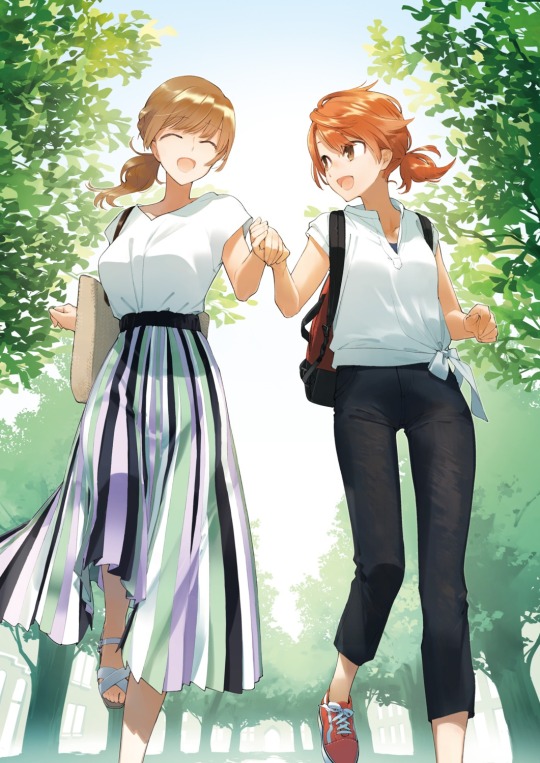
Bloom Into You: Regarding Saeki Sayaka
• School • Drama • Romance
Saeki Sayaka has always been an old soul—serious and reserved, preferring to focus on her studies rather than make friends. Until, that is, a romantic confession from another girl in middle school turns her carefully ordered world upside down. Though none of her classes have prepared her for this, Saeki must now come to terms with her sexuality in this gentle, coming-of-age novel about grappling with first love, growing up, and relating to other people.
~Written by Hitoma Iruma, Illustrated and Created by Nakatani Nio~ Licensed by Seven Seas Entertainment
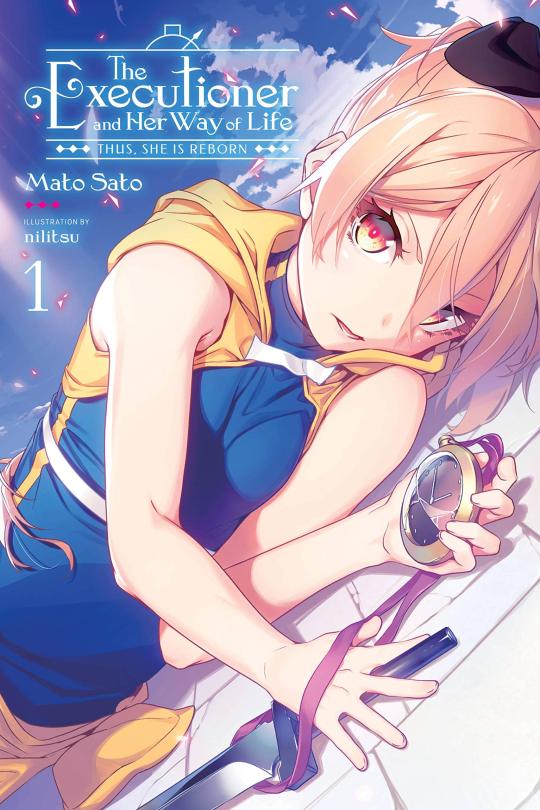
The Executioner and Her Way of Life
• Action • Fantasy • Isekai • Enemies to Lovers
When Menou, an Executioner of deadly interdimensional “Lost Ones,” encounters a Lost One named Akari who can cheat death, she sets out on a mission to kill the unkillable girl — but her newly stirring feelings might get in the way of her blade.
~Created by Mato Sato, Illustrated by nilitsu~ Licensed by Yen Press
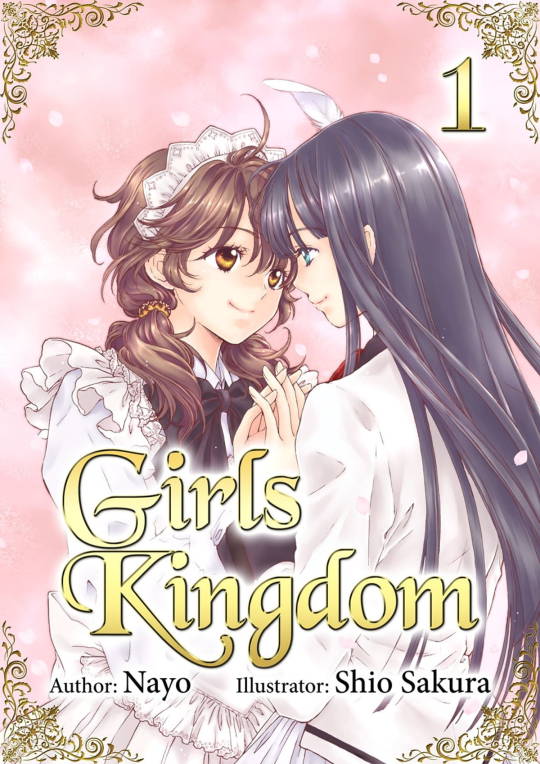
Girls Kingdom
• School • Romance • Comedy • Master/Servant
All Misaki wanted was a free education. Instead, she accidentally lands an exclusive contract with the most prestigious girl in school... to serve as her personal maid! Misaki soon discovers that Amanotsuka Academy for Girls is no ordinary school—her classes are all about how to be a maid, too! Students who impress the school’s elite young ladies with their domestic service skills might be lucky enough to become a “Seraph,” guaranteeing them a job with an upper-class household after they graduate.
~Created by Nayo, Illustrated by Shio Sakura~ Licensed by J-Novel Club
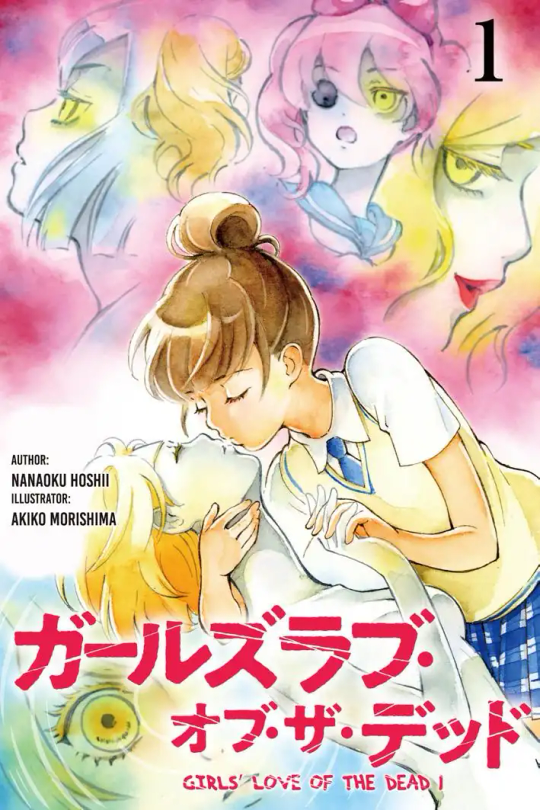
Girls’ Love of the Dead
• Horror • Mystery
When Mitsuki’s best friend suddenly dies, she decides to seek out the old abandoned building of their school, the Romero Private Academy for Girls. But when she meets her dear Rin again, there are quite a lot of reasons why the other girl doesn’t remember her…
~Created by Nanaoku Hoshii, Illustrated by Akiko Morishima~ Licensed by Manga Planet

I’m in Love with the Villainess: She’s so Cheeky for a Commoner
• Isekai • School • Comedy • Action • Fantasy • Romance • Enemies to Lovers
Claire François has it all: beauty, brains, and the blood of nobility. As the daughter of a high-ranking noble, she takes her status and the according responsibilities with utmost seriousness—even as the king threatens to undermine his realm’s stability with his visions of “meritocracy.” Claire is nevertheless prepared to take this societal change in stride, until one of the new commoner students at her elite academy, Rae Taylor, turns her life upside down. Everything about Rae confounds Claire, from her behavior to her intellect to her bizarre fixation on Claire herself. Little does she realize just how much Rae will change her world, and how much she’ll change Rae in turn.
~Created by Inori, Illustrated by Hanagata~ Licensed by Seven Seas Entertainment
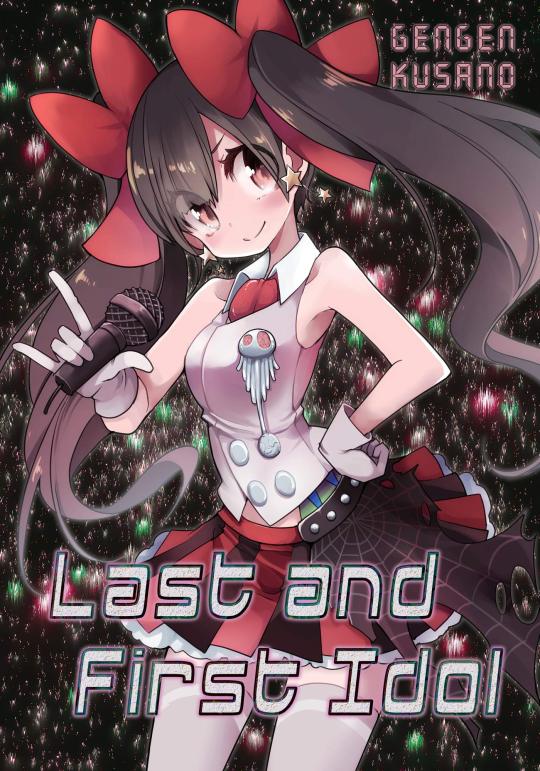
Last and First Idol
• Horror • Sci-Fi • Anthology
"Bye-bye, Earth! My idol activities here were so much fun!” A wannabe idol turned reality-shattering entity, existential isekai organisms, and a space opera about murderous voice actors… Award-winning author Gengen Kusano presenting an astounding collection of three harrowing existential widescreen yuri baroque proletariat hard sci-fi idol story has carved out a new legend in science fiction history! These high-concept stories are crammed full of horrific imagery and exceptionally detailed science that will leave your mind reeling.
~Created by Gengen Kusano~ Licensed by J-Novel Club
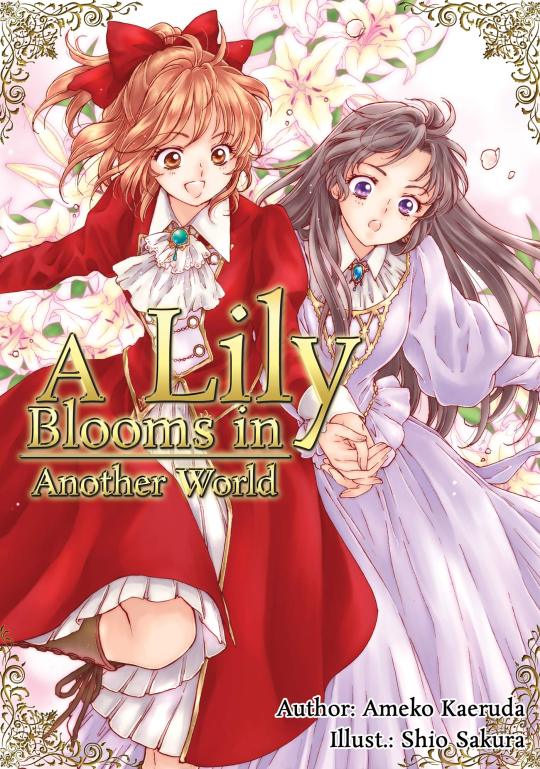
A Lily Blooms in Another World
• Isekai • Romance • Fantasy • Enemies to Lovers
Miyako Florence isn’t sad when her fiancé breaks off their engagement after two years. It’s all according to plan! Whisked into the world of her favorite otome game, Miyako frees herself from a dull noble to pursue her true soulmate: the game’s villainess Fuuka Hamilton. Proud Fuuka only has eyes for their mutual ex-fiancé! Miyako confesses her love to Fuuka and proposes that they run away together. Fuuka agrees on one condition: Miyako must make her say “I’m happy” in 14 days. With conniving nobles, strange diseases, and magical rituals pulling them apart, can Miyako win the villainess’s heart?
~Created by Ameko Kaeruda, Illustrated by Shio Sakura~ Licensed by J-Novel Club
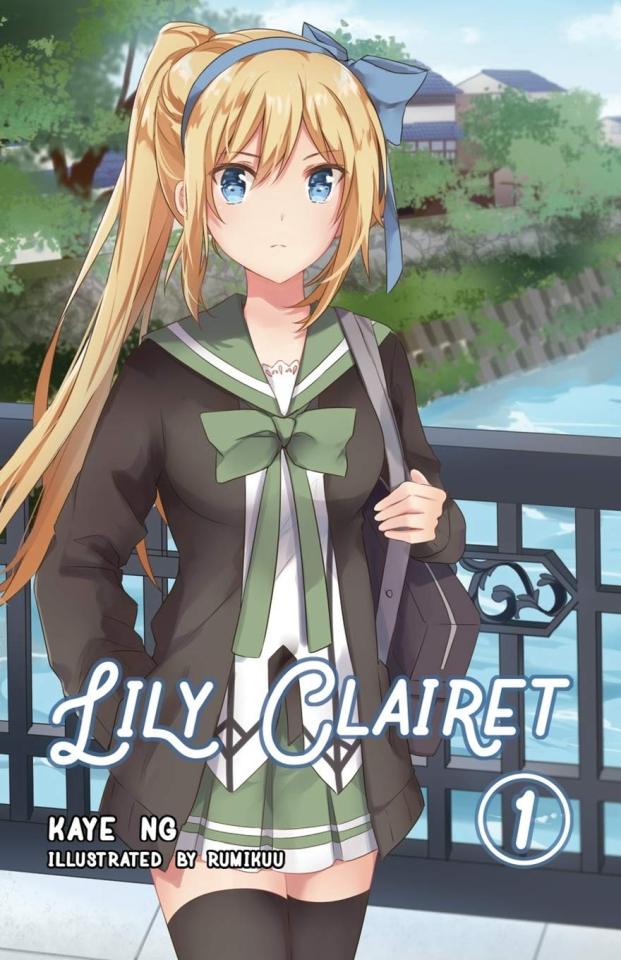
Lily Clairet
• School • Slice of Life • Weak Yuri
A young girl is arguing with a cherry tree. That's a new one for Lily, who's managed to reach the end of her first year at high school without too much weirdness. Unfortunately for her, it's not long after solving this odd mystery that her untroubled life begins to unravel. Discovering an abandoned room at the end of the music department corridor, she finds that aside from it being utterly run-down, it's also devoid of its sole occupant: Sonata Sonoda, the missing journalism club president.
~Created by Kaye Ng, Illustrated by Rumikuu~ Independently Published

LOVELY! My Adorable Mamecchi
• School • Romance • Friends to Lovers
Everyone may have their eyes on the charming, prince-like Hikaru, but there's only one person Hikaru's got her eyes on - her darling childhood friend Mamecchi! But between Mamecchi's hot-and-cold personality and Hikaru's subconscious denials, this sure doesn't look like a recipe for success...when a certain repeat customer gets into Mamecchi's good graces, will Hikaru finally muster up the courage to confess to her first love?
~Kumako Nanbu, Hiromi Takashima~ Licensed by Manga Planet
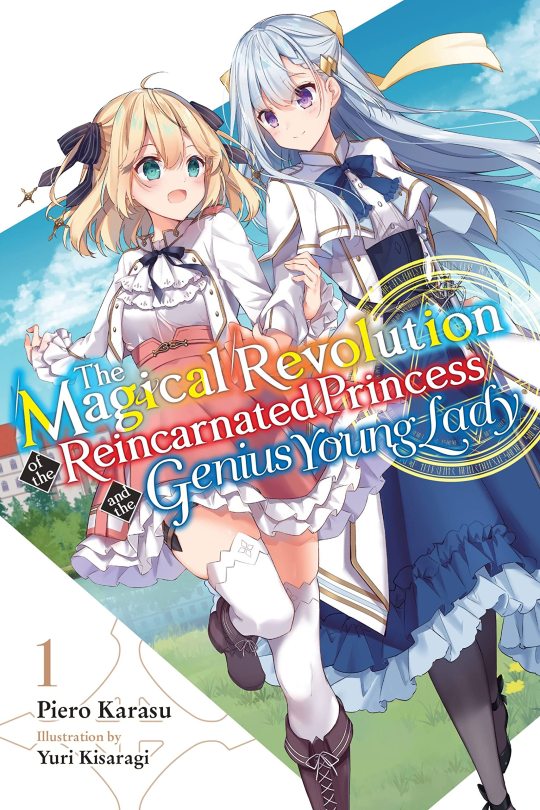
The Magical Revolution of the Reincarnated Princess and the Genius Young Lady
• Fantasy • Romance • Comedy • Isekai
Despite her supposed ineptitude with regular magic, Princess Anisphia defies the aristocracy's expectations by developing "magicology," a unique magical theory based on memories from her past life. One day, she witnesses the brilliant noblewoman Euphyllia unjustly stripped of her title as the kingdom's next monarch. That's when Anisphia concocts a plan to help Euphyllia regain her good name-which somehow involves them living together and researching magic! Little do these two ladies know, however, that their chance encounter will alter not only their own futures, but those of the kingdom...and the entire world!
~Created by Piero Karasu, Illustrated by Yuri Kisaragi~ Licensed by Yen Press
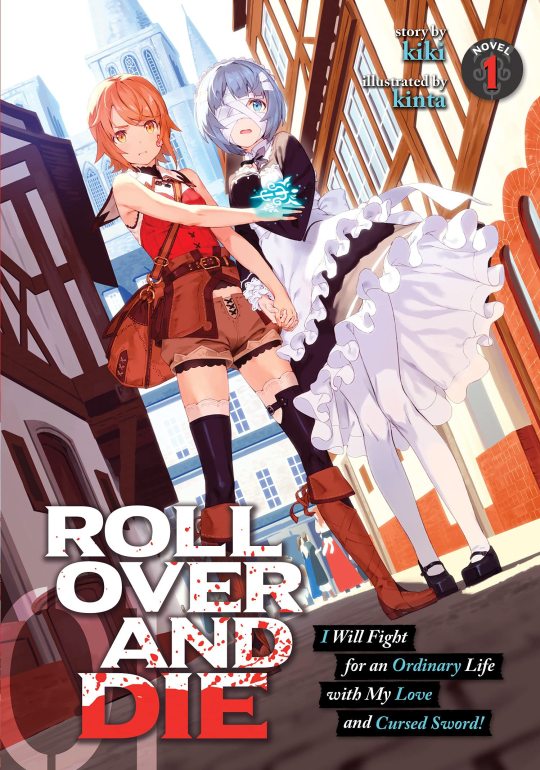
ROLL OVER AND DIE: I Will Fight for an Ordinary Life with My Love and Cursed Sword!
• Fantasy • Action • Horror • Master/Servant • Slow Burn
Flum Apricot was never meant to be a hero. Despite zero stats across the board and a power she can’t even use, she somehow finds herself included in a party of heroes. But Flum’s life hits rock bottom when the party’s renowned sage, Jean Inteige, decides that the useless girl is dead weight, and arranges to have her sold into slavery. Tossed to monsters to be feasted upon for her master’s entertainment, Flum makes the desperate choice to reach for a cursed weapon…and something new awakens within her. A grimdark tale about one woman’s blood-soaked quest to reclaim her life!
~Created by kiki, Illustrated by kinta~ Licensed by Seven Seas Entertainment

Sasayaki no Kiss -Read my lips.-
• School • Romance • Drama
Haruka has always lived in a soundless world. But not in her dreams, where she can hear her own voice - and the voice of the only other person in the dream with her, a beautiful high school student wearing an adorable, unfamiliar school uniform. Haruka knows this is just a dream, but why does a part of her think it's more than that? Is this girl she finds falling asleep in the park really the literal girl of her dreams?
~Created by Kumako Nambu, Illustrated by Akiko Morishima~ Licensed by Manga Planet
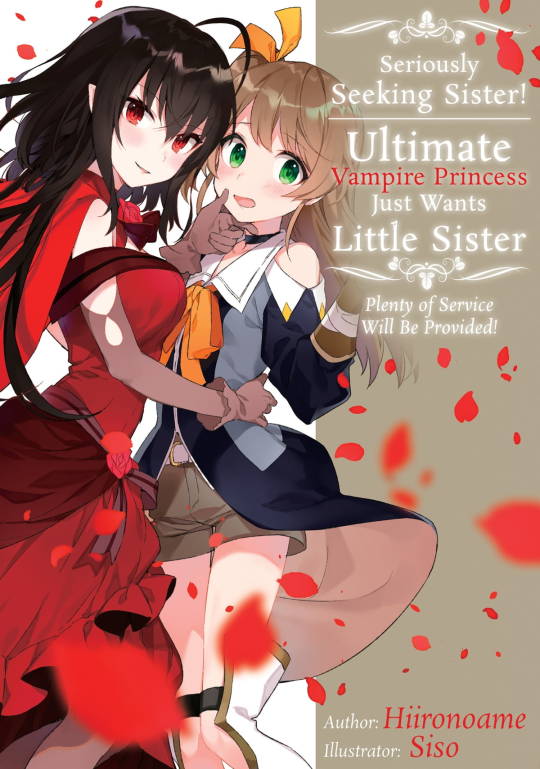
Seriously Seeking Sister! Ultimate Vampire Princess Just Wants Little Sister
• Comedy • Fantasy • Yuri Harem
Long ago, on the continent of Ephenia, there existed the feared tribe of vampires called “True Bloods,” whose great strength allowed them to reign supreme over all other tribes. However, a millennium has passed, and any trace of them has vanished off the face of the planet. That is, until the youngest and most talented royal daughter of the True Bloods awakens in the modern day.
~Created by Hiironoame, Illustrated by Siso~ Licensed by J-Novel Club
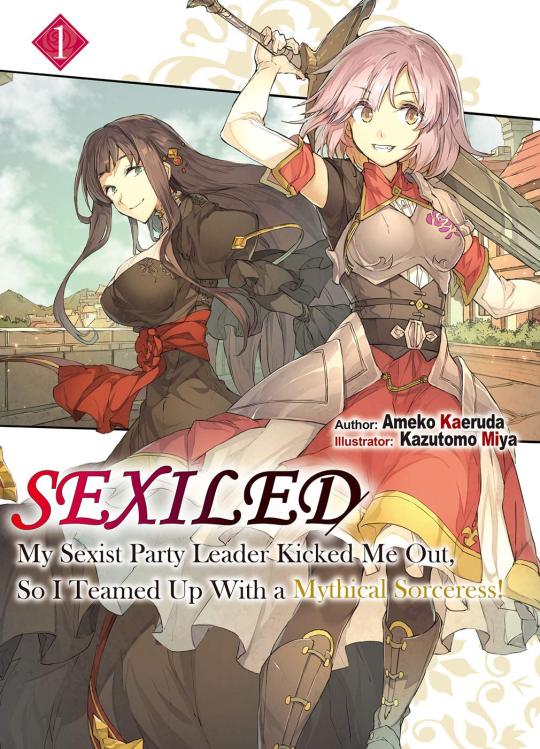
Sexiled: My Sexist Party Leader Kicked Me Out, So I Teamed Up With a Mythical Sorceress!
• Fantasy • Comedy • Action
Tanya Artemiciov is a talented Mage-class adventurer who just got kicked out of her party by a sexist scumbag. So what's a girl to do? Go to the wasteland and blow stuff up of course! One small problem though: she inadvertently frees a mythical Sorceress named Laplace who was sealed away for the past 300 years… Surprise! Turns out this so-called "wicked" Sorceress is actually pretty cool. Laplace wants to start a party of her own, Tanya wants revenge, and the solution is obvious: team up. It's time to kick ass, kiss girls, and dismantle the patriarchy!
~Created by Ameko Kaeruda, Illustrated by Kazutomo Miya~ Licensed by J-Novel Club
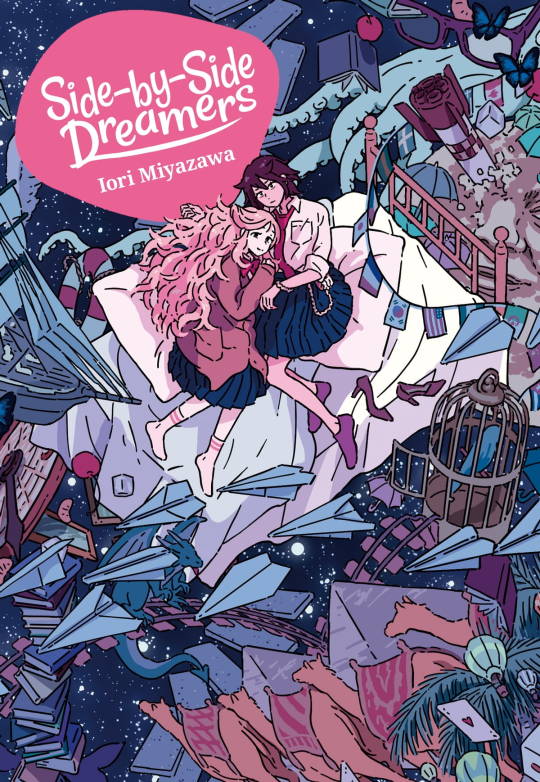
Side-By-Side Dreamers
• Sci-Fi • Supernatural • Action • Fated Lovers • Love at First Sight
Unbeknownst to the common citizens, a battle has been unfolding between the Suiju, beings that possess people's spirits in the land of sleep, and the Sleepwalkers, who have the power to move about freely in their dreams. Saya Hokage, a high school girl who is unable to sleep due to insomnia, encounters Hitsuji Konparu, a girl who can put anyone to sleep as a “lover” in a dream. When Hitsuji's senpai sees potential in Saya, she ends up joining them and their group of Sleepwalkers on their mission.
~Created by Iori Miyazawa~ Licensed by J-Novel Club
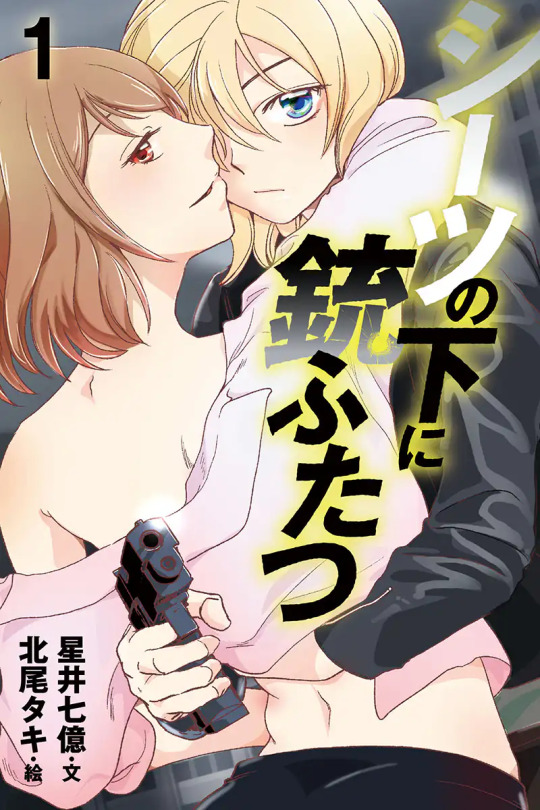
Two Guns Under the Sheet
• Action • Drama • Enemies to Lovers • Shakaijin • Love at First Sight
All Aya wanted was a one-night stand that could take her mind off her lost love, but with Sakura, she may have finally gotten more than a one-night stand - she may have finally found "The One"! But before she rushes into imagining their future together, there's one uncomfortable question Aya has to face first - could it be possible that her beautiful new love is somehow related to the same organization she's bound by duty to destroy?
~Created by Kumako Nambu, Illustrated by Akiko Morishima~ Licensed by Manga Planet

Yuri Tama: From Third Wheel to Trifecta
• School • Romance • comedy
Yuna Momose and Rinka Aiba were made for each other, and their whole school knows it. Between Yuna's princess-like elegance and Rinka's prince-like charm, all their classmates see them as the ideal couple. Yotsuba Hazama is no exception to that, but she is exceptional in another way: she's somehow managed to become fast friends with both of them! Having the whole school's favorite ship as her two best friends isn't exactly easy, though. Not only does it make everyone treat Yotsuba like a particularly obnoxious third wheel, it makes her feel like one too! Or at least it does, until one day, Yuna asks her out. And then Rinka asks her out too! And Yotsuba, whose social anxiety never seems to kick in until after she's already messed something up...says yes to both of them, without sparing so much as a single thought for the consequences. Oops! Now Yotsuba only has one choice: keep her accidental two-timing under wraps and make both of her new girlfriends as happy as she possibly can!
~Created by toshizou, Illustrated by Kuro Shina~ Licensed by J-Novel Club

Yuri Will Not Blossom at Work!
• Drama • Romance • Enemies to Lovers • Shakaijin
Just as Rikka thinks the matchmaking event she grudgingly signed up for can’t get any more dreadful, she runs into her colleague-slash-rival Yuri Kisugi. Using Rikka’s embarrassment as leverage, Yuri compels Rikka into helping her find the perfect candidate to marry. Rikka goes along with Yuri’s antics with the hopes it will lead her rival away while she climbs up the company ranks. But what happens when Rikka’s nurturing tendencies coincide with Yuri’s secret vulnerabilities?…
~Created by Mai Yanagawa, Illustrated by Ruri Hazuki~ Licensed by Manga Planet

Yurizen! Salon -Shirayuri’s Comforting Food Therapy-
• Shakaijin • Romance • Slow Burn
Was it fate that led to Miiko meeting Doctor Shirayuri that one rainy day…or was it just her cramps? Pâtissier Miiko works through little pains like the rest of us, but when her ailments begin to affect her work, there’s got to be something she can do about it. Enter beautiful, mysterious herbal medicine doctor Shirayuri, who might be the solution to Miiko’s problems – in more ways than one!
~Created by Kumako Nambu, Illustrated by Miso Higashikawa~ Licensed by Manga Planet
Read More of the 2023 Yuri Guide
⚪ Must See ⚪ Anime ⚪ Manga ⚪ Visual Novels ⚪ Webtoons
Official releases help support creators and publishers. YuriMother may make a small commission from sales to help fund future content.
Check out the 2023 Yuri Guide page on Bookshop to buy licensed titles and support local bookstores!!

Official releases help support creators and publishers. YuriMother may make a small commission from sales to help fund future content.
Support YuriMother on Patreon for early access and to read exclusive in-depth articles on Yuri and LGBTQ media.
216 notes
·
View notes
Text
This is going to be an extremely messy post, but I’ve been grappling with the argument that “fascism” is nothing more than an exceptionalised label for the cyclical political crises of capitalism, as opposed to an actual historical force in and of itself - just as capitalism has cyclical economic crises which are necessary for its continued functioning, fascism represents the political crises of capital, a bulwark against class consciousness and socialist organising which threaten capitalist rule. Fascism does this by instead emphasising a racial or national consciousness, using white supremacy and the promise of property to divert people away from class consciousness. In Anatomy of Fascism, Paxton talks about how important the promise of property ownership to Italian peasantry was to establishing fascist rule there - class mobility up into the middle classes was used in concert with racial/national politics to stop people from identifying with the proletariat (“homeowners are too busy to be communists,” to paraphrase that American housing developer I forget the name of atm). This is especially weaponised against Jewish people, who are framed as having no national affiliation and are thus eternal outsiders to the bourgeois Christian homeland.
I have encountered a lot of definitions of fascism. The most productive and evocative definition I’ve found is Cesaire’s - colonialism come home. He was speaking of Europe when he said this, saying that Hitler was only doing what Europe did overseas. But what does this mean for settler colonial states? There is no “home” for colonialism to return to for countries like the United States or Canada, because this colonial process has to constantly and at all times maintain itself upon indigenous land in order for the state to continue to exist. The colonialism is always home, always domestic (while also obviously being exercised globally through imperial domination and violence, especially in the case of the United States). Are these states essentially fascist in conception? If this conclusion is true (which I’m leaning towards yes), is “fascism” a useful analytical category at all? If we speak of the political processes of capitalism when we speak of fascism, can we simply just call it all capitalism? It would be like if we called all periods of economic crisis “collapsism” and partitioned these periods of depression or economic instability into exceptional circumstances divorced from the history of capitalism (which we already have done with The Great Depression in the 1930s, or the 2008 Financial Crash - these are exceptional periods where something “went wrong,” where the system “failed”). Sitting with this conclusion for a moment, calling these processes fascist is to divorce them of their material history, to decouple them from the violence and exploitation inherent to capitalism, and to ensure that any analysis of fascism does not conclude with a call to abolish capitalism - for if fascism is merely an interruption of normal capitalist democratic functioning, then preventing future fascisms does not require the abolition of the current economic and political system.
I’ve been engaging with this essay recently, which calls liberals the “left wing of fascism,” and argues that liberalism, far from providing an alternative to fascist rule, instead provides a stabilising quality to it, acting as a stop-gap to the more destabilising right-wing bourgeois elements of capitalism. And despite these conclusions I still find fascism a useful label, both because I think it has a lot of strategic value to engage with particular historical periods (such as right now) as fascist - fascism as a label has widespread recognition, if not widespread understanding - and also because it provides a neat shorthand for the historical process of capitalist political decay.
Anyway I’m talking this all out publicly because I’m in the process of reviewing a lot of literature on the subject for my PhD, and I keep coming to this conclusion - that fascism is not “real” in the sense that it cannot be divorced from capitalism itself, and in fact is a necessary process to the continued functioning of capitalism - but I’m having a hard time seeing what analytical limitations this conclusion produces. I have so far been the most persuaded by post-colonial and Marxist accounts of fascism, but I wonder if multiple definitions of fascism are still strategically or analytically useful to use in concert with one another, even if I disagree with them
143 notes
·
View notes
Text
What I have chosen to do instead of starting my history/film studies essay
Billy Hargrove is a deeply complicated character who was born of two white mens’ want to get out of the very real and valid accusations of racism following the way they wrote Lucas’s character in series 1. However, because this is fandom and The Duffers, there is a tendency to simplify him. And that is fucking boring. This is why (in a very brief form) Billy Hargrove acts the way he does from the perspective of history, politics and sociology.
(Discussing topics less touched on because analysis of Billy in relation to queerness or abuse have been done FAR better than I would explain them)
Even just his name tells us a lot about him as a character. The surname Hargrove originates in Cheshire, in the north west of England. Based on historical context, the Hargrove’s likely moved from Cheshire to Liverpool sometime after 1770, looking for work in Liverpool’s ports, possibly making the move to America sometime post 1850. His mothers side are very clearly Catholic, possibly Irish-Americans. And the first name Billy is a traditional blue collar, working class name. Probably coincidental but a name popular in Liverpool.
Neil and the absolute piece of steaming shit that he is fits in chronologically with the rise of Californian conservatism in the 1960s and 1970s, and the “plain folk” stance that politicians like Nixon took in order to appeal to the white working to upper working class. This type of plain folk outlook blamed both the upper class from the north but also relied on the racist and classist politics of blaming African Americans and those in poverty for all societal ills.
Significantly, Billy in canon was living through a time of globalisation where exposure to the international was becoming more accessible than it had ever been. Just though watching the news it would have been easy to become disillusioned. The Troubles, Brazil’s military dictatorship, The Miners Strike, Israel’s colonisation of Palestine, Cold War propaganda, the AIDS pandemic. It would be very easy to drop into a counter culture subculture.
Do we have any proof that he cared about these issues? Not really. Do we have any proof that he DIDN’T care about these issues though- I’m going to say no to that as well.
Billy represents a more demonised figure than both Eddie and Jonathan for one simple reason though. He is the most stereotypical portrayal of a working class man. Jonathan and Eddie both have tangible connections to interests read as more middle class but Billy’s hyper masculinist presentation and relationship with his car makes him the perfect Proletariat villain.
In relation to why it is so popular to hate Billy in comparison to literally every other character in stranger things, even Neil and Karen, who were objectively terrible people, there could be a lot of different reasons.
One thing is undoubtedly true though.
You can’t ignore Billy Hargrove
37 notes
·
View notes
Text
Idk I’m really luck all things considered. I always feel guilty bc my current field of work is one of the worsssttttttttt like honestly only a step above working for the military (debt collections law firm)
Idk I think what’s fucking me up mentally is everyone here is so nice it feels like none of us are acknowledging the harm we’re doing. And. I know my friends and manager are all here bc we don’t have a choice really. I don’t plan on staying here long.
I guess my issue is bc I don’t feel god awful like I did at my last job I feel guilty bc I’m participating in actively harming society. I’m not. Like. Trying to get someone to comfort me just venting in general. I feel like I should be actively afraid and feeling awful every day like I did at my last job. (For different reasons my previous boss was a dickhead the law itself wasn’t bad)
I should be able to leave in less than a year. I only plan on staying here for as much as I have to. Once I get accepted (if) to law school I can and will change work to something closer to future school.
If I don’t get into law school I’ll take my experience and work in a different law firm.
My point is I feel. Nice that I met so many nice people and friends here. I was really depressed and isolated after I got laid off. I was able to move out of my house thanks to this job. And I’m happy but I feel guilty for being happy (as I should be)
It’s only temporary but I guess my point is. The people minus the bourgeoisie law firm owners are so nice and normal. (The owners are nice too but. They can afford to be nice.) when you think of who works at a debt collection law firm you imagine scum of the earth evil people. In realitily it’s every day people like you and me just another cog in the capitalist machine trying to get by.
The owners and bourgeoisie actively chose to enter this awful field, me and my proletariat workers did not.
Idk I’m not trying to make an excuse for myself but I am making excuses for my fellow workers here. Say what you want about me but I know how we all struggle, and they struggle. For most of us this is a jumping board to better less awful work as soon as we can get out.
I made a lot of nice friends here and I was so lonely and isolated before I had this job. People who are introverts like me and don’t mind how of putting other more extroverts usually find me.
Just thinking to myself bc I’m an open fucking book here and post about my entire life
24 notes
·
View notes
Text
White libs will say shit like “well both parties are supporting the genocide of brown people so you have to consider other things when voting…like how it will affect white women and white queers remember VOTE BLUE NO MATTER WHO!!”
And not realize…. How fucked is it ? To say that??? Like we know. We KNOW! The fucking smugness with which they say shit like “yeah this imperialist war machine is gonna slaughter you and your Arab family no matter what.. now grow up and vote the way we tell you like a good little proletariat… the suffering of your people is a moot point so vote for the guy who is better for white women and white queers”
And I will. And I know her policy is better. And I know cop city is still better than project 2025. I’m under no delusion that Harris isn’t significantly better than trump. But every single liberal smugly saying ‘they are both gonna firebomb poor Arabs so get over it so we can focus on real issues’ makes my stomach turn. Yet again people of color are being told to vote en mass for the benefit of white people and are told that our suffering is not only inevitable, but irrelevant and that we OWE something to white democrats by nature of them not being “as bad” as the far right…. While at the same time being told to shut up about the genocide.
I’m gonna vote for her. I always was and it was never a question for me because I understand the game is a losing one. But every single liberal saying vote blue no matter who needs to shut the fuck up. You want more people of color to vote blue? Fine. Use the argument that when Harris is in office you will rally to nonstop with calls and protests and lobbying and strikes to the the White House and state reps and local reps until all brown and black bodies are safe… but that require white liberals to actually care about black and brown rights when it’s not an election year which will never happen.
Y’all are Pearl clutching over roe v wade and obergfell v hodges, saying we are going backwards when black and brown people have been telling you for DECADES we are still fighting for desegregation! Over 50% of students of color attend majority minority schools [population of 90%< students of color] but I don’t hear y’all complaining about brown v board of education. I’m fucking sick and tired of liberals begging for people of color to show up on Election Day and then telling us not only to shut up about violence against us in this country… but that we are stupid and immature for even considering it when voting because genocide is bipartisan and we should get over it
#fucking whatever#vote blue#I guess#fucking shoot me Jesus Christ#joe biden#kamala harris#project 2025#2024 elections#politics#donald trump
21 notes
·
View notes
Text

Foundations
José Llanquileo is four years into a five year sentence for arson. For three years he was living in clandestinity with his partner, Angelica, and for a year was one of the Chilean state’s most wanted fugitives. In 2006, the two were finally captured. She was acquitted on charges of illegal association, under the antiterrorist law. He was convicted for burning pine trees on a forestry plantation belonging to a major logging company, as part of a land reclamation action. Now he gets work release during the day, and furloughs on the weekends, so he has time to take us around Temuco, introduce us to the hungerstrikers, and tell us his story.
We’ve come here as anarchists, to learn about the Mapuche struggle, to tell about our own struggles, to see where we have affinity, and begin creating a basis for long-term solidarity.
Fortunately, we can start on a good foundation. The leftists have had a patronizing attitude towards the Mapuche, says José, but “the anarchists have been very respectful, and shown lots of solidarity. I think we should be grateful for that.” He’s clear, however, that the Mapuche’s struggle is their own. Marxism was influential at a certain moment, but they are not Marxists. One could characterize the Mapuche way of thinking as environmentalist, but they are not environmentalists. They have affinity with anarchists, but they are not anarchists. “We are Mapuche. We are our own people, with our own history, and our struggle comes directly out of that.” Contrary to the assertions of the leftists, the Mapuche are not the marginalized lower class of Chilean society. They are not the proletariat, and the idea of class war does not correspond to their reality. Consequently, they may find some affinity with the revolutionary movements that developed in the context of class war in European society, but these movements do not adequately address their situation.
“The Left consider the Mapuche as just another sector of the oppressed, an opinion we don’t share. Our struggle is taking place in the context of the liberation of a people. Our people are distinct from Western society.” Moreover, the Mapuche people have a proud history of fighting invasion, resisting domination, and organizing themselves to meet their needs and live in freedom, so their own worldview and culture are more than sufficient as an ideological basis for their struggle.
This point is stressed by nearly everyone we meet, and I think our ability to become friends and compañeros rests directly on the fact that we respect their way of struggle rather than trying to incorporate them into our way of struggle.
I want to be upfront with the people I meet, with whom I want to build relationships of solidarity, so on the first day I tell him my motivations and assumptions. The comrades who put us in touch already told José I’m an anarchist, and informed him of the kind of work I do, so the fact that he invited us into his community and took time off to guide us around is a good sign. I let him know that many US anarchists already have a little familiar with the Mapuche struggle, and our understanding is that their culture is anti-authoritarian, and they organize horizontally. Is this correct?
José says it is, but I notice a little eurocentrism on my part, a difference in worldviews, when he automatically replaces my word, “horizontal,” with the word “circular,” to describe Mapuche society. There is no centralization of power among the Mapuche, who in fact are a nation of several different peoples, living in different geographic regions, and speaking different dialects of the same language. The land belongs to the community, and it is maintained collectively, as opposed to individually or communally. Each community has a lonko, a position generally translated as “chief,” but each family has a large degree of autonomy, and many decisions are made by the whole community in assemblies. Lonkos are usually men, but have been women as well. There are other traditional roles of influence: the machi is a religious figure and a healer. Men and women can become machis, but they are neither chosen nor self-appointed. Those who have certain dreams or get inexplicably sick as children, and who demonstrate a certain sensitivity, will become machis. Then there is the werken, the spokesperson, a role that has taken on explicitly political characteristics as Mapuche communities organize their resistance. Historically there were tokis, war leaders that different communities followed voluntarily, though currently no one plays this role, as the Mapuche have not gone to war since being occupied by the Chilean and Argentinean states in the 1880s.
I ask about gender relations and how the Mapuche view things like family structure and homosexuality, making clear my own feelings but also trying not to be judgmental. José says the Mapuche family structure is the same as in European society, and there is a great deal of conservatism, pressure to marry and have children, and disapproval of anything that falls outside of this format. He thinks that maybe it didn’t used to be like that, and perhaps the Catholic missionaries and conservative Chilean society have changed traditional values. In any case, the women we meet during our limited time in the communities are all strong, active, vocal, and involved, and in the homes we stay in there seem to be a sharing and a flexibility of roles. The people in our group, meanwhile, don’t try too hard to present as heterosexual or cis-gendered and don’t have any problems.
* * *
It’s an exciting time to be in Wallmapu. All the communities in resistance are united behind the hungerstriking prisoners, but behind the scenes, important debates are taking place. The hungerstrike, based directly on the ongoing struggle (all the Mapuche prisoners are accused or convicted of crimes related to land recovery actions, such as arsons targeting the forestry companies, or related to conflict with the Chilean state, such as the seizing of a municipal bus or a shooting that gave a good scare to a state’s attorney), has focused the Mapuche nation and captured the attention of the entire Chilean population. It has won a popular legitimacy for the Mapuche struggle, undermining the demonization of the direct tactics they use and weakening the government’s position in casting these tactics as terrorism. In this situation, the Mapuche can go beyond calls for greater autonomy or land reform within the Chilean state.
“The so-called Mapuche conflict doesn’t have a solution. The demands we have necessitate a break with the framework of the state. What we demand is sovereignty and Mapuche independence. We consciously propose the historical foundations of these demands [...] Our struggle is fundamentally opposed to capitalism and the state [...] I believe we have to open a space internationally to spread our demands. The Mapuche struggle has to be internationalist, as the struggle of a people. Many of the things that affect us, like capitalism and the states that represent it, the US, the EU, are an enemy to peoples, First Nations as much as oppressed classes around the world, and that’s a point of concordance.”
“The biggest problem is the advance of capitalism, in the form of investment on our lands. This is one of the principal threats that the Mapuche face because it means the exploitation of natural resources. These resources are on Mapuche lands, so investment means the expulsion of the inhabitants,” José explains. “Even while we’re recovering our lands, this investment is going on, which endangers everything we have achieved.”
* * *
After a few days, we leave Temuco and head for the hills, to the town of Cañete, and then to the first of a couple autonomous Mapuche communities in resistance we’ve been invited into, in the area of the lake Lleu Lleu, south of the city of Concepcion. Mapuche communities have two names, or rather, the place has a name, and the group of people has another name. José’s community, Juana Millahual, at Rucañanko, sits on a steep hill above one arm of the lake. It is a small community, with just a few dozen families. José’s brother is lonko. The houses are mostly small, rectangular, wooden buildings sitting atop low stilts. José explains that the traditional houses, the ruca, had thatched instead of tin roofs, but these have been mostly burned down over the decades of struggle.
The oldest knowledge they have of the community is in 1879, when José’s great grandmother had 10,000 hectares. Now the community only has 300 hectares, but they are in the process of recovering 1000 more hectares, 220 of which they have occupied. “In these territories there is a profound transformation where big capital has exploited natural resources and where the Mapuche are trying to recompose their spaces.” They’re recovering their traditions and parts of their culture that were nearly lost, and when they retake a plot of land, they take it out of the hands of Capital “which says it exists to serve man and must be exploited. When the Mapuche occupy it, there is a revolutionary change, a profound transformation to the social, cultural, religious, and economic fabric.” When they recover land, their machis come and the whole community performs a Ngillatun, a major ceremony, to purge it from its time as private property and to communalize it.
At his house, during his weekend furlough, José tells us more about the Mapuche history. The Mapuche territories used to extend from near the present locations of Santiago and Buenos Aires, Pacific coast to Atlantic coast, south to the island of Chiloe. Farther south, on the southern cone of the continent, other peoples lived. They were hardy nations that survived the extreme temperatures without problems, but were mostly exterminated when the Europeans came.
José explains that winka, the term the Mapuche have given to the European invaders, simply means “new Inca.” Before the arrival of the conquistadors, the Inca nation were already engaging in a sort of regional imperialism, which the Mapuche wanted no part in. The Inca armies got as far south as present-day Santiago, where they were defeated and consistently prevented from advancing any farther. When the Spanish arrived, the Mapuche treated them as just the most recent invaders, and defeated them as well. It’s a point of pride that the Inca, who had an advanced, centralized civilization, fell easily to the conquistadors, while the Mapuche, who were decentralized, never did. What the Spanish couldn’t understand was that there was no single Mapuche army. Each group of communities had their own toki, and if the Spanish won a battle against one group of warriors, as soon as they advanced a little farther they’d have to face another one.
During my time in Wallmapu, I think a lot about what it means to be a people. From the traditional anarchist standpoint, a people or a nation is an essentializing category, and thus a vehicle for domination. However, it becomes immediately clear that it would be impossible to support the Mapuche struggle while being dismissive of the idea of a people.
Hopefully by this point all Western anarchists realize that national liberation struggles aren’t inherently nationalist; that nationalism is a European mode of politics inseparable from the fact that all remaining European nations are artificial constructions of a central state, whereas in the rest of the world (excepting, say, China or Japan), this is usually only true of post-colonial states (like Chile or Algeria) that exist in direct opposition to non-state nations. Many other nations are not at all homogenizing or centrally organized.
Going beyond this, though, is it essentializing to talk about a Mapuche worldview or way of life? The more I listen, however, the more I doubt my accustomed standpoint. To a great extent, Mapuche is a chosen identity. Most “Chileans” have black hair, broad faces, and brown skin, while less than 10% of the population of the Chilean state identify as Mapuche. In a context of forced assimilation and a history of genocide, choosing to identify as Mapuche is, on some levels, a political statement, a willful inheritance of a cultural tradition and hundreds of years of struggle, and an engagement with an ongoing strategic debate that perhaps makes it legitimate to talk about what the Mapuche want, what they believe, in a more singular way. At one point, when we’re talking about mestizos, José makes it clear that someone is Mapuche if they identify as such, even if they have mixed parentage. In other words the Western notion of ethnicity, which leaves no room for choice because it is based on blood quanta, does not apply. Also, the fact that the Mapuche call the Europeans the “new Inca” show that they do not have an essentializing, generalizing view of sameness between all indigenous peoples. On the contrary, many people we met specified an interest in connecting specifically with other First Nations that were fighting back against their colonization, showing that what they cared about was not a racial category, but a struggle.
So if Mapuche is a chosen identity based on a very real shared history, shared culture, and ongoing collective debate of strategy, is it actually all that different from the identity of anarchist? Well, yes: it has a longer history, tied to a specific geographic territory and cultural-linguistic inheritance. Anarchism also contains a greater diversity of worldviews, but on the flipside no one I met tried to present the Mapuche as homogenous, even as they talked about a Mapuche worldview.
In sum, the concept of belonging to a people brings a great deal of strength to the Mapuche struggle. Because the state falls outside of and against that people and their history, I find some elements of the Mapuche reality, of their world, to be a more profound realization of anarchy than I have found among self-identified anarchists. And considering that those anarchist movements that have been able to maintain just 40 years of historical memory (Greece, Spain) are consistently stronger than anarchist movements that have a hard time even understanding the concept of historical memory (US, UK), it is no surprise that the Mapuche, who maintain over 500 years of historical memory, are so strongly rooted that they seem impervious to repression.
#wallmapu#deep ecology#anarchism#revolution#climate crisis#ecology#climate change#resistance#community building#practical anarchy#practical anarchism#anarchist society#practical#daily posts#communism#anti capitalist#anti capitalism#late stage capitalism#organization#grassroots#grass roots#anarchists#libraries#leftism#social issues#economy#economics#anarchy works#environmentalism#environment
20 notes
·
View notes